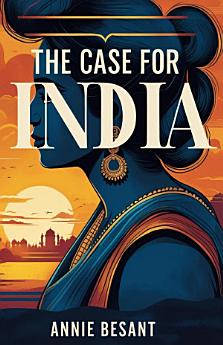The Case for India
Jul 2025 · BEYOND BOOKS HUB
Ebook
54
Pages
reportRatings and reviews aren’t verified Learn More
About this ebook
The Case for India by Annie Besant is a bold and impassioned defense of India’s right to self-rule, written by one of the most influential British-born leaders of the Indian independence movement. First published during the early 20th century, the book is a compelling political statement advocating for Home Rule—a system of self-government for India within the British Empire. The book opens with a powerful Presidential Address and a tribute titled Gone to the Peace, setting a solemn tone of both reverence and urgency. In Chapter 1: Pre-War Military Expenditure, Besant lays out how India was drained economically to support imperial military ambitions. She follows this with Chapter 2: Causes of the New Spirit in India, highlighting the rise of political consciousness in the subcontinent. Subsections such as The Awakening of Asia, Discussions Abroad on Alien Rule, and Loss of Belief in the Superiority of White Races reveal how the tides of global thought were shifting toward justice and equality, while The Awakening of Indian Womanhood illustrates the profound internal transformation within Indian society. The heart of the book is Chapter 3: Why India Demands Home Rule, where Besant distinguishes between the vital and secondary reasons for India's rightful claim to self-governance. She argues not only from a political and economic standpoint but also from a moral and philosophical perspective, asserting the dignity and capability of the Indian people. Besant’s writing is direct, eloquent, and often confrontational. As a British woman who adopted India as her spiritual and political home, her voice carried unique authority both in the East and the West. This book is not just a political argument—it is a call to conscience for imperial Britain and a rallying cry for the Indian people.
About the author
Annie Besant (1847–1933) was a British-born social reformer, theosophist, and fierce advocate for Indian independence. She served as president of the Indian National Congress and played a pivotal role in launching the Home Rule Movement. A gifted orator and writer, Besant merged Western liberalism with Eastern spirituality, leaving a profound legacy in both political and cultural spheres of modern India.
Rate this ebook
Tell us what you think.
Reading information
Smartphones and tablets
Install the Google Play Books app for Android and iPad/iPhone. It syncs automatically with your account and allows you to read online or offline wherever you are.
Laptops and computers
You can listen to audiobooks purchased on Google Play using your computer's web browser.
eReaders and other devices
To read on e-ink devices like Kobo eReaders, you'll need to download a file and transfer it to your device. Follow the detailed Help Center instructions to transfer the files to supported eReaders.








